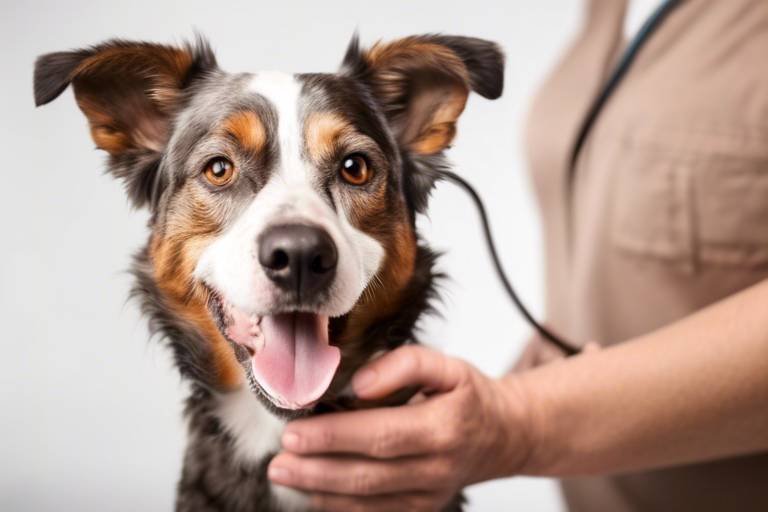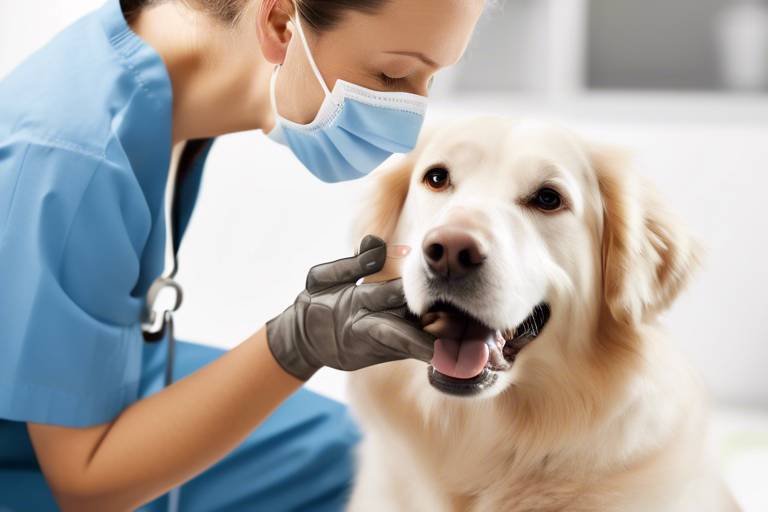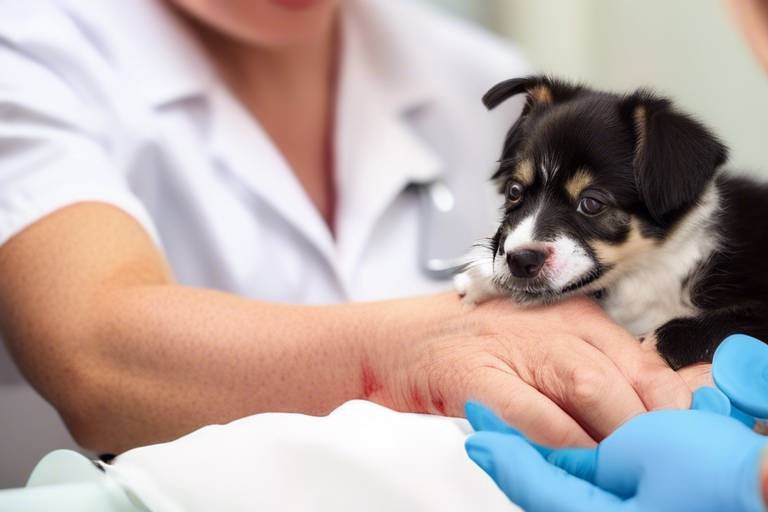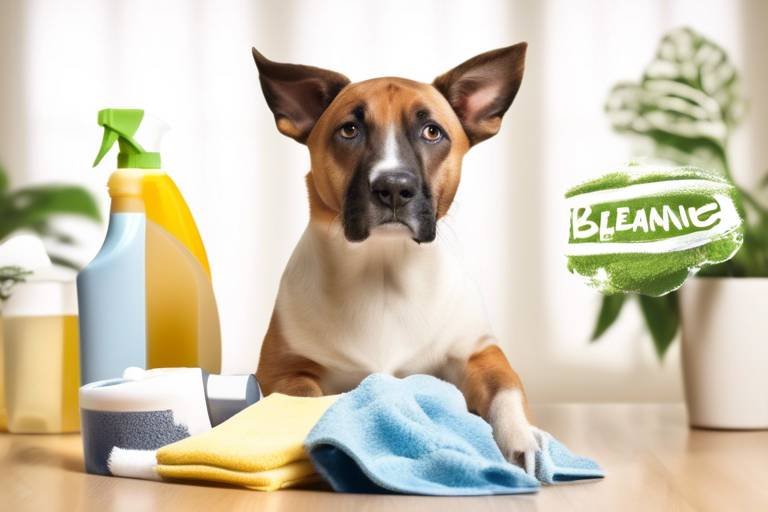The Importance of Regular Health Screenings for Aging Pets
As our beloved pets grow older, their health needs evolve significantly. Just like humans, aging pets require more attention and care to ensure they live a fulfilling and comfortable life. Regular health screenings become crucial during this stage, acting as a proactive approach to detect any underlying health issues before they escalate. Imagine your pet as a fine wine; it needs the right conditions to age gracefully. In this article, we will explore why regular check-ups are essential for your aging companions and how they can help maintain their quality of life.
Routine health screenings for older pets can lead to early detection of diseases, which is paramount in providing timely treatment. The earlier we catch a problem, the better the outcome. Think of it this way: wouldn’t you prefer to know about a potential problem early on rather than waiting for it to become a serious issue? Regular check-ups can reveal potential health risks that you might not notice in daily life, ensuring that your furry friend gets the care they need when they need it most.
Moreover, these screenings often include a comprehensive evaluation of your pet's overall health, covering everything from their weight and dental health to their organ function. This holistic approach not only helps in identifying health issues but also allows for tailored preventive care strategies. For instance, if your pet is diagnosed with early-stage arthritis, your veterinarian can recommend lifestyle changes, medications, or therapies to manage their discomfort and maintain mobility. The importance of these screenings cannot be overstated; they are the key to unlocking a longer, healthier life for your aging pet.
In the following sections, we will delve deeper into the unique challenges faced by aging pets, the common health issues that arise, and the vital role of preventive care in enhancing their quality of life. By understanding these aspects, you can become a more informed pet owner, ensuring that your furry friend receives the best possible care as they age.
- How often should I take my aging pet for health screenings? Generally, annual check-ups should transition to semi-annual or quarterly visits as your pet ages.
- What specific tests are recommended for senior pets? Common tests include blood work, urinalysis, and imaging studies to monitor organ function and detect diseases early.
- What signs indicate my pet needs a check-up? Look for changes in appetite, weight loss, lethargy, or any behavioral changes that seem out of the ordinary.
- How can I choose the right veterinarian for my aging pet? Look for a vet with experience in geriatric care who can provide tailored advice on screenings and treatments.

Understanding Aging in Pets
This article discusses the significance of routine health check-ups for older pets, emphasizing the benefits of early detection, preventive care, and maintaining a high quality of life as they age.
Aging is a natural process that every pet goes through, much like how we humans experience the passage of time. As our furry friends grow older, their bodies undergo a series of changes that can affect their overall health and well-being. These changes can manifest in various ways, including alterations in behavior, mobility, and even physical appearance. For instance, you might notice your once sprightly dog now prefers lounging on the couch instead of chasing after squirrels. This shift can be concerning, but understanding the aging process is crucial for providing the best care possible.
One of the most significant changes that occur in aging pets is the decline in their metabolic rate. This means that their bodies may not process food as efficiently as before, leading to weight gain or loss. Additionally, their joints can become stiffer, making everyday activities like jumping onto the bed or taking a stroll in the park more challenging. It's essential for pet owners to be observant of these changes, as they can often indicate underlying health issues that need attention.
Moreover, just like humans, pets can experience cognitive decline as they age. This can result in confusion, disorientation, and changes in sleeping patterns. It’s not uncommon for older pets to forget their favorite toys or become anxious when left alone. This cognitive shift can be distressing for both the pet and the owner, making it all the more important to monitor their mental health alongside their physical health.
To help pet owners better understand what to look for, here are some common signs of aging in pets:
- Decreased Activity: Less enthusiasm for playtime or walks.
- Changes in Appetite: Eating less or showing disinterest in food.
- Weight Fluctuations: Gaining or losing weight unexpectedly.
- Altered Sleep Patterns: Sleeping more or less than usual.
- Behavioral Changes: Increased anxiety or confusion.
Recognizing these signs early can make a world of difference in how we manage our pets' health as they age. If you notice any of these changes, it’s a good idea to consult with your veterinarian. They can help assess your pet’s condition and recommend appropriate interventions. Remember, just because your pet is aging doesn't mean they can't enjoy a happy and fulfilling life. With the right care and attention, you can ensure that your furry companion remains comfortable and content in their golden years.
Senior pets are prone to various health problems, including arthritis, dental disease, and organ dysfunction. Awareness of these issues enables owners to seek timely veterinary care and manage their pets' health effectively.
Preventive care is vital in maintaining the health of aging pets. Regular screenings can identify potential health issues before they become severe, allowing for early intervention and better outcomes for your furry friends.
Veterinarians recommend several screening tests for aging pets, including blood work, urinalysis, and imaging studies. These tests help monitor organ function, detect diseases early, and tailor treatment plans to individual needs.
The frequency of health screenings for aging pets varies based on their age, breed, and health status. Generally, annual check-ups become semi-annual or quarterly as pets reach their senior years.
Pet owners should be vigilant for signs that indicate a need for a veterinary check-up, such as changes in appetite, weight loss, lethargy, or behavioral changes. Early intervention can make a significant difference.
Early detection of health issues in aging pets can lead to more effective treatment options and improved quality of life. Regular screenings empower pet owners to make informed decisions about their pets' health care.
Selecting a veterinarian experienced in geriatric pet care is essential. A knowledgeable vet can provide tailored advice on screenings, treatments, and lifestyle adjustments to support the health of aging pets.
Q: How often should I take my senior pet to the vet?
A: Generally, senior pets should have check-ups every six months, but consult your vet for personalized recommendations.
Q: What are the signs that my pet is aging?
A: Look for decreased activity, changes in appetite, weight fluctuations, altered sleep patterns, and behavioral changes.
Q: Can aging pets still enjoy exercise?
A: Yes! While they may need modified activities, regular gentle exercise is crucial for their physical and mental health.
Q: Are there specific diets for aging pets?
A: Yes, many pet food brands offer diets formulated for senior pets, which can help manage their health needs.

Common Health Issues in Senior Pets
As our beloved pets age, they become more susceptible to a variety of health issues that can significantly impact their quality of life. Just like humans, pets experience a myriad of changes as they grow older, and being aware of these potential problems can help you provide the best care possible. One of the most common health concerns for senior pets is arthritis. This degenerative joint disease can cause pain and stiffness, making it difficult for your furry friend to engage in activities they once enjoyed, such as playing fetch or jumping onto the couch.
Another prevalent issue is dental disease, which can lead to serious complications if left untreated. Senior pets often develop plaque and tartar buildup, leading to gum disease and tooth loss. Regular dental check-ups and cleanings are essential to maintain their oral health. Additionally, as pets age, they may experience organ dysfunction, particularly in the kidneys and liver. This can result in a host of symptoms, including increased thirst, frequent urination, and changes in appetite. Monitoring your pet's behavior and health can help catch these issues early.
Moreover, senior pets are at a higher risk for cancer. Tumors can develop in various parts of the body, and early detection is crucial for effective treatment. Regular veterinary visits and screenings can help identify any abnormal growths or changes in your pet's health. Other common concerns include obesity, which can exacerbate joint problems and lead to other health complications, and cognitive dysfunction syndrome, which is similar to dementia in humans and can affect your pet's behavior and memory.
To summarize, here are some of the most common health issues faced by senior pets:
- Arthritis - Joint pain and stiffness
- Dental Disease - Gum disease and tooth loss
- Organ Dysfunction - Kidney and liver issues
- Cancer - Tumors and abnormal growths
- Obesity - Excess weight leading to other health problems
- Cognitive Dysfunction Syndrome - Memory and behavior changes
By staying informed about these common health issues, you can take proactive steps to ensure your senior pet remains happy and healthy. Regular veterinary check-ups, a balanced diet, and appropriate exercise can make all the difference in managing these conditions and enhancing your pet's quality of life.
Q: How often should I take my senior pet to the vet?
A: It's generally recommended to take senior pets for check-ups at least twice a year, but some may require more frequent visits depending on their health status.
Q: What are the signs that my pet might be in pain?
A: Look for changes in behavior, such as reluctance to move, changes in appetite, excessive grooming, or unusual vocalizations.
Q: Can diet help manage my senior pet's health issues?
A: Absolutely! A balanced diet tailored to your pet's specific health needs can help manage conditions like obesity and arthritis.
Q: Are there any supplements that can benefit senior pets?
A: Yes, supplements such as glucosamine for joint health and omega-3 fatty acids for inflammation can be beneficial. Always consult your veterinarian before starting any new supplements.

The Role of Preventive Care
When it comes to our beloved aging pets, preventive care is not just a luxury—it's a necessity. Just like humans, pets experience a range of health changes as they grow older. These changes can sneak up on us, often manifesting in subtle ways that might go unnoticed if we aren't paying close attention. That's where the magic of preventive care comes into play! By scheduling regular health screenings, you can catch potential issues before they escalate into serious problems. Think of it as a safety net for your furry friend, ensuring that they lead a happy, healthy life well into their golden years.
Preventive care encompasses a variety of practices aimed at maintaining your pet's health. This includes not only routine check-ups but also vaccinations, dental care, and nutritional guidance. Imagine your pet's health as a garden; without regular tending, weeds (or health issues) can take root and flourish. By proactively managing your pet's health, you can help them thrive rather than merely survive. Regular screenings allow veterinarians to monitor key health indicators, such as blood pressure, kidney function, and overall vitality. These tests provide a snapshot of your pet's health, helping to identify any red flags early on.
Moreover, preventive care is not just about treating issues that arise; it's about fostering a strong, ongoing relationship between you and your veterinarian. This partnership is crucial, as your vet can offer tailored advice based on your pet's specific needs. For instance, if your pet is diagnosed with a condition like arthritis, your vet can recommend lifestyle changes, such as weight management or joint supplements, that can significantly improve your pet's quality of life. This proactive approach often leads to better outcomes and can even extend your pet's lifespan.
To illustrate the importance of preventive care, consider the following table that outlines common preventive measures and their benefits:
| Preventive Measure | Benefits |
|---|---|
| Regular Health Screenings | Early detection of health issues, tailored treatment plans |
| Vaccinations | Protection against infectious diseases |
| Dental Care | Prevention of dental disease and related health problems |
| Nutrition Management | Maintains a healthy weight and supports overall health |
In conclusion, preventive care is a powerful tool in the arsenal of pet ownership. It empowers you to take charge of your pet's health, ensuring they remain vibrant and active as they age. By prioritizing regular check-ups and maintaining open communication with your veterinarian, you are not only enhancing your pet's quality of life but also creating a happier, healthier future for your furry family member. So, don’t wait until something seems off—make preventive care a priority today!
- How often should I take my aging pet for check-ups?
Typically, senior pets should have check-ups at least twice a year, but your veterinarian may recommend more frequent visits based on your pet's health status. - What tests are included in a routine health screening?
Common tests include blood work, urinalysis, and sometimes imaging studies to assess organ function and detect underlying health issues. - Can I manage my pet's health at home?
While home care is important, regular veterinary check-ups are crucial for monitoring health and catching any potential issues early. - What signs indicate my pet might need a check-up sooner?
Look for changes in appetite, unusual weight loss, lethargy, or any behavioral changes that seem out of character.

Recommended Screening Tests
When it comes to the health of our beloved furry friends, especially as they age, regular screenings become a vital part of their care regimen. Just like we humans undergo routine check-ups to catch potential health issues early, our pets need the same level of attention. The right screening tests can mean the difference between a long, happy life and one filled with unnecessary suffering. So, what tests should you be looking for? Let's break it down.
First and foremost, blood work is essential. A complete blood count (CBC) and a chemistry panel can provide invaluable insight into your pet's overall health. These tests help to monitor organ function, detect infections, and assess nutritional levels. It's like getting a snapshot of your pet's internal health, allowing veterinarians to catch any abnormalities before they escalate into serious problems.
Another important screening test is a urinalysis. This test analyzes your pet's urine for signs of kidney function, urinary tract infections, and other potential issues. Just imagine your pet's kidneys as a filter – if they're not functioning properly, it can lead to a buildup of toxins in their body. A urinalysis can help ensure those filters are working as they should.
In addition to blood and urine tests, imaging studies such as X-rays or ultrasounds can be crucial for aging pets. These imaging techniques allow veterinarians to visualize internal structures, helping to identify conditions such as arthritis, tumors, or organ enlargement. Think of it as a window into your pet's body; it provides a clearer view of what might be going on beneath the surface.
To give you a clearer idea, here's a quick overview of the recommended screening tests for aging pets:
| Test | Purpose |
|---|---|
| Blood Work | Monitors organ function, detects infections, and assesses overall health. |
| Urinalysis | Evaluates kidney function and checks for urinary tract infections. |
| Imaging Studies | Visualizes internal structures to identify conditions like arthritis or tumors. |
It's important to remember that every pet is unique, and their health needs may vary. Consulting with your veterinarian about which tests are most appropriate for your pet’s specific age, breed, and health status is crucial. Regular screenings not only help catch potential issues early but also empower you as a pet owner to make informed decisions regarding your furry friend's health.
- How often should I have my aging pet screened? It generally depends on your pet's age and health status, but annual check-ups often become semi-annual or quarterly as they age.
- What signs indicate my pet needs a check-up? Look for changes in appetite, weight loss, lethargy, or any unusual behaviors.
- Are these tests painful for my pet? Most tests, like blood draws, are quick and minimally invasive. Your vet will ensure your pet is as comfortable as possible.

Frequency of Health Screenings
When it comes to our furry companions, especially as they grow older, the frequency of health screenings becomes a critical factor in ensuring their well-being. Just like humans, pets age at different rates, and this can vary based on their breed, size, and overall health. For instance, larger breeds tend to age faster than smaller ones, which can significantly influence how often they should visit the vet. Generally speaking, while young pets may only require annual check-ups, senior pets often need more frequent evaluations.
As a rule of thumb, once your pet reaches the age of seven, it’s wise to shift from annual visits to bi-annual or even quarterly check-ups. These more frequent screenings allow veterinarians to monitor any potential health issues that may arise as your pet ages. This proactive approach enables early detection and intervention, which can be crucial in managing conditions that could otherwise escalate into serious health problems.
Here’s a quick breakdown of how often your pet should ideally see the vet as they age:
| Age Group | Recommended Frequency of Check-Ups |
|---|---|
| Young (0-1 year) | Once a year |
| Adult (1-6 years) | Once a year |
| Senior (7-10 years) | Twice a year |
| Geriatric (10+ years) | Every 3-4 months |
It’s important to note that these are general guidelines and can vary based on your pet's specific health needs. For example, if your pet has a pre-existing condition or is recovering from surgery, your veterinarian may recommend more frequent visits. Always communicate openly with your vet about any concerns or changes in your pet’s behavior, as this can help tailor the screening schedule to better suit their needs.
In conclusion, keeping a close eye on the frequency of health screenings for your aging pet is not just a good practice; it’s a loving commitment to their health and happiness. By staying proactive, you can help ensure that your furry friend enjoys their golden years to the fullest.
- How often should I take my senior pet to the vet? It’s generally recommended to take senior pets for check-ups every six months, but this can vary based on their health status.
- What should I expect during a health screening? A typical health screening may include a physical examination, blood tests, and possibly imaging studies to assess your pet's overall health.
- Are there specific signs that indicate my pet needs to see the vet sooner? Yes, look for changes in appetite, weight loss, lethargy, or any unusual behavior, as these may indicate underlying health issues.

Signs Your Pet Needs a Check-Up
As a loving pet owner, it's essential to be observant and attentive to your furry friend’s behavior and physical condition. Pets, much like humans, can experience changes in their health that may not always be immediately apparent. So, how do you know when it’s time to schedule that all-important veterinary check-up? Here are some key signs to watch for:
First and foremost, changes in appetite can be a significant indicator. If your pet suddenly loses interest in their food or begins overeating, this could signal underlying health issues. Similarly, weight loss is another red flag. If your pet seems to be shedding pounds without any change in diet or exercise, it’s time to consult your veterinarian. Remember, just like humans, pets can also suffer from conditions that lead to unintentional weight changes.
Lethargy is another symptom that should never be ignored. If your usually playful pup or curious cat seems to be sleeping more than usual or shows reluctance to engage in their favorite activities, it could indicate a health problem. Additionally, keep an eye out for any behavioral changes. Are they hiding more than usual? Have they become more irritable or withdrawn? These changes can be subtle but are important to note.
Another important aspect to consider is grooming habits. If your pet is neglecting their grooming routine, it might be a sign that they are not feeling well. For instance, if your cat is no longer keeping their fur clean and tidy, or if your dog has stopped enjoying their usual baths, these could be signs of discomfort or illness. Additionally, vomiting or diarrhea, even if occasional, should prompt a visit to the vet, especially if it persists.
Finally, don’t forget to pay attention to your pet’s mobility. If you notice them struggling to jump onto the couch or going up and down stairs, it could be a sign of arthritis or joint issues, which are common in older pets. Regular check-ups can help catch these problems early, allowing for timely treatment and improved quality of life.
In summary, being proactive about your pet's health is crucial. By recognizing these signs early, you can ensure that your beloved companion receives the care they need to thrive in their golden years. Remember, early intervention can make all the difference!
- How often should I take my aging pet for a check-up?
For most senior pets, it's recommended to schedule check-ups at least twice a year. However, your veterinarian might suggest more frequent visits based on your pet's specific health needs. - What should I expect during a veterinary check-up?
A typical check-up will include a thorough physical examination, discussions about your pet's diet and behavior, and possibly some diagnostic tests like blood work or urinalysis. - Are there specific tests for senior pets?
Yes, veterinarians often recommend tests such as blood work, urinalysis, and imaging studies to monitor organ function and detect any potential health issues early.

Benefits of Early Detection
When it comes to our beloved furry companions, early detection of health issues can be a game-changer. Imagine being able to catch a potential problem before it escalates into something serious. Just like how we humans benefit from regular check-ups, our pets thrive from the same kind of attention. Early detection can lead to a myriad of benefits that not only enhance the quality of life for aging pets but also provide peace of mind to their owners.
One of the most significant advantages of early detection is the ability to initiate preventive measures. For example, if a veterinarian identifies early signs of arthritis, they can recommend changes in diet or suggest supplements that may help alleviate discomfort. This proactive approach can make a world of difference in your pet's daily life. Instead of waiting until your pet is in pain or struggling to move, you can take action right away, ensuring they remain active and happy.
Moreover, early detection often leads to more effective treatment options. Many health conditions, such as diabetes or kidney disease, can be managed more successfully if caught early. This means your pet may require less aggressive treatment, which can be less stressful and more comfortable for them. For instance, if a senior dog is diagnosed with kidney issues, a veterinarian may recommend dietary changes and regular monitoring rather than immediate medication or invasive procedures.
Another critical aspect is the financial benefit that comes with early detection. While the initial cost of regular screenings may seem daunting, consider the potential savings. Treating advanced-stage illnesses can be significantly more expensive than managing conditions caught early on. By investing in routine health check-ups, you may save on costly treatments down the line. It’s a bit like maintaining your car; regular oil changes and check-ups can prevent a much larger repair bill later.
Additionally, early detection can improve the overall emotional well-being of both pets and their owners. Knowing that you are taking proactive steps to care for your pet fosters a sense of security. You can enjoy your time together, knowing that you are doing everything possible to keep them healthy. This emotional connection is invaluable and contributes to a happier household.
In summary, the benefits of early detection in aging pets are profound. From enhancing their quality of life to saving money and providing peace of mind, regular health screenings are an investment worth making. By staying vigilant and proactive, you can ensure that your furry friend enjoys their golden years to the fullest.
- How often should I take my aging pet for health screenings?
Generally, senior pets should have check-ups at least twice a year. However, your veterinarian may recommend more frequent visits based on your pet's specific health needs. - What are the common signs that indicate my pet needs a check-up?
Be on the lookout for changes in appetite, weight fluctuations, increased lethargy, or any unusual behaviors. These can be signs of underlying health issues. - Can early detection really make a difference?
Absolutely! Early detection can lead to earlier interventions, which often result in better health outcomes and improved quality of life for your pet.

Choosing the Right Veterinarian
When it comes to the health of your beloved aging pet, selecting the right veterinarian is absolutely critical. Just like you would want a doctor who understands the unique needs of elderly patients, your furry friend deserves a vet who specializes in geriatric care. But how do you find that perfect match? It’s not just about picking the closest clinic; it’s about ensuring that your pet receives the best possible care tailored to their specific needs.
First and foremost, consider the experience of the veterinarian. Look for someone who has a strong background in treating senior pets. They should be well-versed in common geriatric issues such as arthritis, kidney disease, and dental problems. A vet with this expertise can provide invaluable insights into your pet's health and recommend appropriate screenings and treatments. You might ask yourself, “How do I gauge their experience?” A good starting point is to read reviews or ask other pet owners for recommendations.
Another important factor to consider is the clinic's environment. Is it clean, welcoming, and equipped with modern technology? A well-maintained clinic often reflects the quality of care provided. When you walk in, do you feel comfortable? Are the staff friendly and knowledgeable? A positive atmosphere can make a significant difference, especially for anxious pets. It’s worth visiting a few clinics to get a feel for where you and your pet will feel most at ease.
Communication is key in any relationship, and the vet-client bond is no exception. You want a veterinarian who listens to your concerns and explains things clearly. Don’t hesitate to ask questions about your pet’s health, treatment options, and preventive care. A good vet will take the time to ensure you understand everything, making you feel like a valued partner in your pet’s health journey. Think of it like a team effort; you both have a role to play in keeping your furry friend healthy!
Additionally, consider the availability of the veterinarian. Emergencies happen, and you want to ensure that your vet is accessible when you need them most. Ask about their hours of operation and whether they offer emergency services or have partnerships with local emergency clinics. This can provide peace of mind, knowing that you won’t be left scrambling if your pet experiences a sudden health issue.
Lastly, don’t forget to inquire about the cost of care. While you want the best for your pet, it’s essential to find a veterinarian whose services fit within your budget. Many clinics offer payment plans or accept pet insurance, which can ease the financial burden of unexpected veterinary visits. Be sure to discuss these options upfront, so you’re not caught off guard later.
In conclusion, choosing the right veterinarian for your aging pet is a decision that should not be taken lightly. By considering experience, clinic environment, communication style, availability, and costs, you can find a vet who will be a true partner in your pet’s health care. Remember, your pet relies on you to make informed decisions, and finding the right veterinarian is one of the most important steps you can take to ensure they enjoy a happy, healthy life in their golden years.
- How often should I take my aging pet to the vet? - Generally, senior pets should have check-ups at least twice a year, but this may vary based on their specific health needs.
- What should I look for in a veterinarian? - Look for experience with geriatric pets, good communication skills, a welcoming environment, and availability for emergencies.
- Are there specific tests my aging pet should undergo? - Yes, common tests include blood work, urinalysis, and imaging studies to monitor organ function and detect diseases early.
Frequently Asked Questions
- Why are regular health screenings important for aging pets?
Regular health screenings are crucial for aging pets because they help detect potential health issues early on. Just like us, as pets age, their bodies undergo changes that can lead to various health problems. Early detection allows for timely interventions, which can significantly improve their quality of life and longevity.
- What common health issues should I look out for in senior pets?
Senior pets are often susceptible to a range of health issues, including arthritis, dental disease, and organ dysfunction. Being aware of these conditions can help you notice any changes in your pet's behavior or health, prompting you to seek veterinary care sooner rather than later.
- How often should I take my aging pet for health screenings?
The frequency of health screenings for aging pets typically increases as they get older. While annual check-ups are standard for younger pets, senior pets may require check-ups every six months or even quarterly, depending on their health status and breed.
- What specific tests are recommended for aging pets?
Veterinarians often recommend several screening tests for aging pets, such as blood work, urinalysis, and imaging studies. These tests are essential for monitoring organ function and detecting diseases early, enabling tailored treatment plans for your furry friend.
- What signs indicate that my pet needs a check-up?
Watch for signs like changes in appetite, weight loss, lethargy, or any changes in behavior. If you notice any of these symptoms, it's essential to consult your veterinarian. Early intervention can make a world of difference in your pet's health.
- How can early detection benefit my aging pet?
Early detection of health issues allows for more effective treatment options and can lead to a better quality of life for your pet. Regular screenings empower you as a pet owner to make informed decisions regarding your pet's healthcare, ultimately leading to happier and healthier years together.
- What should I consider when choosing a veterinarian for my senior pet?
When selecting a veterinarian for your aging pet, look for someone with experience in geriatric care. A knowledgeable vet can provide tailored advice on screenings, treatments, and lifestyle adjustments that cater specifically to the needs of older pets.



















